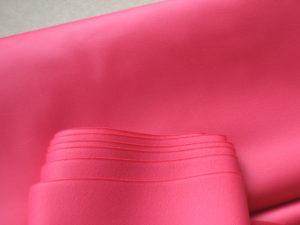Orthopaedics / footwear industry
• Protective layer on toes of alpine, hiking and safety footwear
• Anti-slip layer under orthopaedic soles
• Anti-slip layer under overshoes
Thermoplastic polyurethanes (TPUs) are exceptionally wear-resistant, flexible plastics. The combined properties of this high-quality material are unmatched: abrasion resistance, shock absorption, grip on slippery surfaces and low weight. Vreeberg produces foamed TPU film primarily for use in the footwear industry.
Durable and flexible
Foamed TPU film is especially suitable as a non-slip, wear-resistant protective layer on the outside surface of shoes, such as safety shoes, alpine boots or hiking boots. TPU retains its special properties even in wet conditions, and is therefore often used as part of orthopaedic insoles.

Composition
Thermoplastic polyurethanes (TPU) are a group of elastomeric (i.e. flexible) block copolymers, based on urethane segments plus ester or ether segments. The hardness depends on the chemical structure of the copolymer, and can range from 60 Shore A to 74 Shore D. The typical hardness is 95 Shore A, as commonly used in the components of conveyor systems.
Resistance to cold and heat
Together with the excellent resistance to abrasion and tearing, the flexibility of TPU even at very low temperatures makes this plastic highly suitable for the components of conveyor systems. TPU products can sustain a temperature of up to 110°C for a short period. However, prolonged exposure to temperatures higher than 80°C should be avoided.
TPU undergoes thermoplastic deformation at 90-120°C.
Resistance to oils and UV
TPU is resistant to oils and aliphatic hydrocarbons. Unleaded gasoline can cause the TPU to swell slightly due to the aromatic compounds in the fuel. TPU has excellent resistance to UV light.
Limitations
TPU is not resistant to concentrated acids and alkalis, chlorinated and aromatic hydrocarbons, alcohols and hot water.
• Protective layer on toes of alpine, hiking and safety footwear
• Anti-slip layer under orthopaedic soles
• Anti-slip layer under overshoes
• Anti-slip layer under furniture
• Conveyor system components, such as drive belts.
Hard-wearing
TPU is highly resistant to wear and tear.
Light weight
TPU from Vreeberg is ‘foamed’. This technique enables a considerable weight reduction to be achieved, and yet the resistance to wear is superior to that of other flexible materials, such as rubber.
Sustainable
The foamed TPU that we produce is recyclable. Scrap material from production is re-used, and we also accept scrap materials returned by customers.
Shock absorbent
TPU has excellent cushioning qualities, thanks in part to its foamed structure. This enhances the comfort of footwear and similar products.
Pliable
TPU is easier to process than rubber and can be readily formed around irregular shapes, such as a shoe. The stiffness of rubber is a limitation on its suitability.
Soft and flexible to the touch
Pleasant tactile experience, suitable for ‘soft touch’ surfaces.
Anti-slip
Adds grip to shoes and furniture. For example, we supply TPU to a customer who incorporates it into the sole of cycling shoes to prevent the insole from moving in the shoe. For similar reasons, orthopaedic insoles often have a thin layer of TPU.
No skid marks
TPU leaves no skid marks, making it a great choice for footwear and anti-slip feet for furniture.
Easily bonded
The foamed structure of TPU enhances its adhesion to other materials. TPU can therefore be bonded to other materials without the need for surface preparation such as degreasing or corona treatments. This results in cost and production time savings for our customers.
Also suitable for water-based adhesives
TPU is suitable for both solvent and water-based adhesives.
Recyclable
Finished TPE can be re-used as a raw material without problems. We therefore re-use all of our start-up material and scrap. We also accept scrap material from customers for re-use in production.
TPU does not sustain higher temperatures well. Above 80°C, the strength declines and the material softens. This material is therefore unsuitable for steam sterilisation. However, sterilisation is possible with EtO gas or gamma irradiation.
TPU is also harmed by contact with oils and fats, making it less suitable for applications in the food industry.
Moreover, the material is less suitable for fire-retardant or extinguishing applications. This is because the addition of a flame retardant adversely affects the flexibility of TPU.
Do you have the need for a thin, elastic film? Vreeberg also produces TPE: Thermoplastic Elastomer